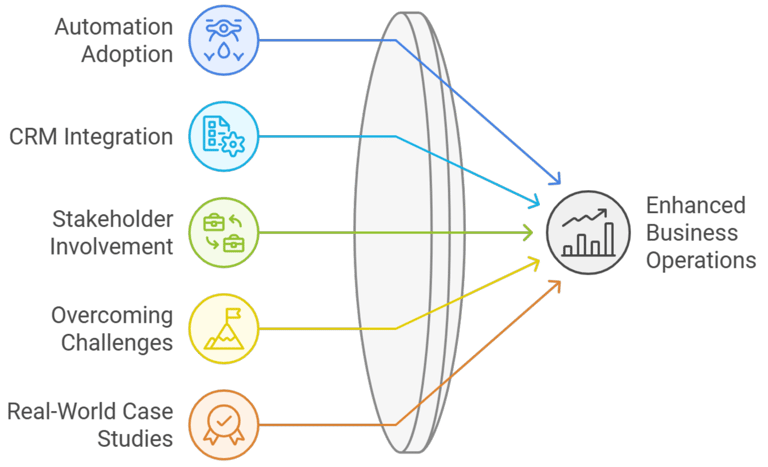

Quote-to-contract automation leverages advanced technology to streamline the creation and finalization of business agreements. By automating these processes, companies can transform manual, time-consuming tasks into efficient, seamless operations.
Benefits of Quote-to-Contract Automation
Quote-to-contract automation offers several significant advantages that can boost a company's operational efficiency and customer satisfaction.
Increased Speed and Efficiency
With automation, the turnaround time for generating proposals and contracts is significantly reduced. This acceleration minimizes the likelihood of human errors, ensuring that all documents produced are accurate and fully compliant with relevant regulations.
Enhanced Customer Satisfaction
Customers today demand quick and reliable service. Automation enables companies to provide faster responses, thereby enhancing customer experience. This can be a substantial competitive edge in a crowded marketplace, ensuring businesses stand out through exemplary customer service.
Productivity and Strategic Decision-Making
By reducing reliance on manual processes, teams are liberated to focus on higher-value tasks. This shift allows for more strategic decision-making and ensures proposals reflect the most current pricing, terms, and conditions, ultimately speeding up internal processes and enhancing client satisfaction.
Improved Compliance
Automated systems rigorously adhere to regulatory requirements and company policies, thereby minimizing risks. Automation facilitates easy updates and modifications, ensuring contracts stay relevant and compliant with evolving standards, particularly crucial in heavily regulated industries.
Key Components for Success
Successful quote-to-contract automation hinges on several critical components that form the backbone of an effective strategy:
Integration with CRM Systems
Integrating customer relationship management systems with automation tools ensures seamless data transfer and reduces the need for manual data entry. This integration acts as the central hub for customer interactions, providing real-time access to crucial data needed for generating accurate quotes and contracts.
Data Accuracy and Consistency
Automation processes are only as reliable as the data they utilize. It is essential that this data is clean, current, and standardized across platforms. Such measures enhance the reliability of automated processes and support compliance with regulatory requirements, which is particularly important in contract and agreement management.
Customizable Templates and Workflows
Through the use of customizable templates and workflows, businesses can tailor automation processes to fit unique needs, ensuring the generated documents meet specific industry standards and client expectations. Customization allows for quick adjustments in response to changing business environments or regulatory landscapes.
Analytics and Reporting
Incorporating analytics and reporting capabilities provides valuable insights into the efficiency and effectiveness of automation processes. These tools enable businesses to make data-driven decisions and continuously improve operations, maximizing the benefits of automation.
Partnering with an Automation Agency
Partnering with an automation agency can be transformative for businesses seeking optimization in their quote-to-contract processes. These agencies bring expertise and resources that might not be available internally.
Tailored Solutions
Agencies can tailor solutions specifically to a business's needs, ensuring a more efficient and effective implementation.
Comprehensive Services
From initial consultation and strategy development to implementation and ongoing support, agencies provide an end-to-end service model. This ensures businesses are equipped with the tools they need along with expert guidance throughout their automation journey.
Staying Ahead of Trends
Agencies offer valuable insights into emerging technologies, helping businesses stay ahead of the curve in a rapidly evolving digital landscape.
Overcoming Challenges
Data Security
Data security is a common concern, especially with sensitive customer and contract information in play. Implementing robust security measures like encryption, strict access controls, and regular audits is crucial for safeguarding data integrity.
Managing Organizational Change
Automation often alters workflows, requiring employees to adapt. To overcome resistance, businesses should communicate clearly and provide comprehensive training to ease the transition. Early engagement of employees ensures they are comfortable and confident with new technologies.
Data Quality
Maintaining data accuracy and consistency is vital; inaccurate data can compromise contracts and proposals. Regular audits and advanced data validation tools help maintain high data quality, ensuring system functionality.
Continuous Improvement
The landscape of automation technology continuously evolves. Regularly reviewing and refining automated processes is essential to adapt to changes and ensure long-term success.
Case Studies: Automation in Action
Real-world examples highlight the tangible benefits of automation in transforming business operations:
Manufacturing Company
A mid-sized manufacturing company faced significant delays due to manual quoting and contract creation. By implementing automation, the company reduced its quote-to-contract time by 50%, leading to faster deal closures and improved customer satisfaction.
Leading IT Services Provider
An IT services provider integrated automation tools with its existing CRM system, which allowed for a seamless data flow and eliminated redundant data entry. This led to a 30% increase in sales efficiency and a considerable improvement in client relationships, as sales representatives could focus more on customer engagement.
Conclusion
Embracing modern quote-to-contract automation is not merely a technological upgrade but a strategic imperative for businesses aiming to thrive in today's competitive landscape. Automating these processes significantly reduces time and errors associated with manual efforts, enhancing both accuracy and customer satisfaction.
The integration of CRM systems with automation tools ensures data consistency and reliability, crucial for maintaining compliance and building trust with clients. By following a clear plan and involving key stakeholders, businesses can overcome challenges such as data security and change management, reaping the rewards of streamlined processes, reduced operational costs, and improved service delivery.
Real-world case studies demonstrate the remarkable outcomes businesses can achieve through automation. As technology continues to advance, the potential for automation to revolutionize business operations will only grow, making it a critical consideration for forward-thinking organizations.